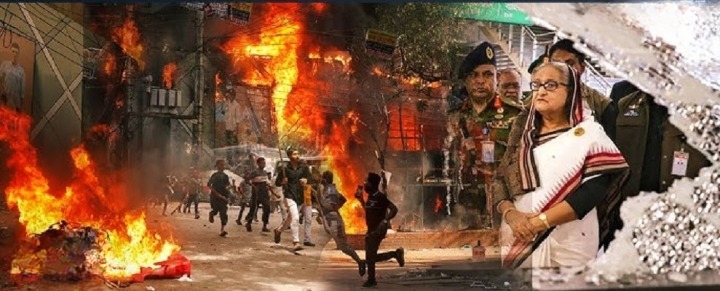Protesters oust B’Desh Govt Hasina resigns, flees country, reaches India
| Date :06-Aug-2024 |

By Anisur Rahman
DHAKA ;
As violence gripped Bangladesh amid ongoing student protests, Sheikh Hasina resigned as country’s Prime Minister and left the country in a military helicopter and landed at the Hindon airbase in India.
Several reports cited that Hasina will be leaving for London soon. Later, Bangladesh Army stepped in to fill the power vacuum, ending one uncertain chapter and opening another in the nation’s restive history.
As news of Hasina’s departure spread, hundreds broke into Hasina’s residence, vandalising and looting the interiors, providing dramatic expression to the anti-Government protests that have killed more than 100 people in the last two days. At the centre of people anger is the
Hasina Government’s controversial quota system reserving 30 per cent jobs for families of veterans who fought the 1971 liberation war.
With volatile crowds taking to the streets -- some clambering on Hasina’s father and Bangladesh founder Sheikh Mujibur Rahman’s statue and smashing it with hammers in a lasting image underscoring the fickleness of history -- Army chief General Waqar-uz-Zaman announced that the 76-year-old Prime Minister has resigned.
After hours of uncertainty
in a day of sudden developments, Hasina landed at the Hindon airbase in Ghaziabad near New Delhi on her way to London, diplomatic sources in the Indian capital said. She arrived in India in a C-130J military transport aircraft of the Bangladesh Air Force.
In an interview to Newshour on the BBC World Service, Joy said there would be no political comeback for his mother. He said that Hasina had been considering resigning since Sunday and had left the country for her own safety after her family insisted.
Joy said that his mother, who ruled Bangladesh for 15 years, was “so disappointed that after all her hard work, for a minority to rise up against her”, according to the report. Expressing Hasina’s disappointment, he said, “She has turned Bangladesh around.
When she took over power, it was considered a failing State. It was a poor country. Until today, it was considered one of the rising tigers of Asia. She’s very disappointed.”
Rejecting accusations that the Government had been heavy-handed in dealing with protesters, Joy said, “You’ve had policemen beaten to death – 13 just yesterday. So what do you expect the police to do when mobs are beating people to death?” The protesters demanded an end to the controversial quota system that reserved 30 per cent of Government jobs for relatives of veterans who fought in Bangladesh’s War of Independence in 1971.